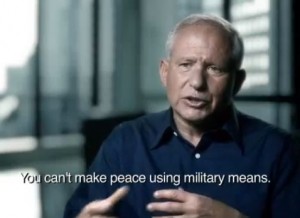
Dror Moreh
LONDON. He is proud of himself. "It was a clean operation", says Carmi Gillon, "elegant". He smiles like a small boy, who is almost embarrassed to be so proud. Maybe deep down he knows that not everybody will praise him for killing Palestinian bomb maker Yahya Ayyash per remote-controlled mobile phone in 1996. "Only he died. No one else. And on the ground floor they did not even hear the explosion."
The Israeli documentary "The gatekeepers" carries a disturbing message. The film was nominated for Best Foreign Film at the Oscars this year. It did not win. But it certainly could have. Film maker Dror Moreh convinced six former security chiefs of the
internal secret service "Shin Bet” to speak about their work. Why did they speak out? "They think if we don't do something now, we might go beyond the point of no return”, explained film maker Dror Moreh after the movie was screened at the Filmfest of “Human Rights Watch” in London on Friday. This alone would have been a sensation: After all security chiefs are supposed to keep their secrets to themselves.
But Dror Moreh achieved even more than just making them talk. These men speak about the Unspeakable: about their doubts. "There never was a strategy, only tactics", says Avraham Shalom, the oldest of them. He has never given an interview before and we see him struggle with some of his answers, he changes from witty grandfather to cold-hearted executioner. The film shows the development of Israeli security policy since the occupation of West Bank and Gaza in 1967. With historical footage obtained from his interviewees, Moreh shows how security policy changed after the political leadership committed the biggest mistake of Israel's history which still haunts the state today: the conquered territories were not returned. Illegal Israeli settlement activity started at the beginning of the Seventies. The "Israeli defence forces" subsequently turned more and more into an army of occupation.
First they recruited thousands of informants among the Palestinian population in order to control them. "Shin bet" is Israel’s internal security service, as opposed to "Mossad", which operates outside of Israel. The first Intifada in 1987 was difficult for the security chiefs. A mass revolt of stone-throwers pushed the army further down the road rowards becoming an occupation force. "One man’s terrorist is another man’s freedom fighter", says Yakov Peri.
This became particularly difficult to understand when Israel and the PLO signed the Oslo accords in 1993. "At the beginning I felt I was doing something wrong", admits Yuval Diskin about the cooperation with the Palestinian counterparts: "Till then we were fighting against these guys and now we were supposed to work with them?"
But soon after in 1994 the terrorist attacks against Israeli civilians started, organised by Palestinian enemies of peace. And by Israeli enemies of peace. When Jitzhak Rabin was killed by an Israeli settler, the
situation for the secret service became ever more complicated. They now needed to identify "good" and "bad" Palestinians as well as "good" and "bad" Israelis.
Before he was murdered, Rabin made crucial decisions, which later helped to derail the Oslo process. When the first Hamas prisoner died from "baby shake syndrome" Shin Bet’s Carmi Gillon told Rabin: "If we stop these methods we will not prevent 90 percent of attacks, but only 70." Rabin responded: "We make peace as if there was no terrorism. But we also fight terror as if there was no peace agreement."
It is sensational how openly the six men talk about their work, which clearly put them under heavy moral strain. Moreh's film will have an enormous impact, not only because these men say what they say. But because of how the present it. They are authentic. They criticise a system whose product they are. And they clearly feel, that the state for whose service they signed up for has changed its character. Carmi Gillon says: "We make the live of millions of people unbearable." And Ami Ayalon comes to the conclusion: "So far we have won every battle. But we are losing the war."

Avi Dichter in "The Gatekeepers"
The security services in Israel are very prestigious institutions, those who go workt here were always considered among the very brightest. "The gatekeepers" therefore is a wake up call from the establishment to the public to change tcourse before it is too late. Moreh himself is very pessimistic: “The Israeli Prime Minister is nt strong enough to carry the political weight of what it needs to do. Our tragedy is that we need two great leaders on both sides at the same time. When Rabin was prime minister we had Arafat, who was, let’s say, problematic. Now we have Mahmoud Abbas and on the other side – Netanyahu."
The Prime Minister was probably relieved when “The Gatekeepers” failed to win an Oscar. But for Moreh the film already had a big impact. Someone in the PM’s
inner circle told the film maker Netanyahu thought "The gatekeepers" cost his right wing Likud party 7 to 9 mandates in the last Israeli elections in January.
http://www.thegatekeepersfilm.com/


